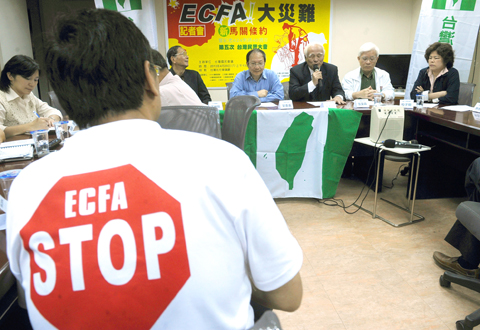|
¡@
Ex-MAC official calls for ECFA consensus
By Ko Shu-ling
STAFF REPORTER
Wednesday, Apr 21, 2010, Page 3
¡@

Speakers from pro-independence umbrella group
the Taiwan National Congress hold a press conference in Taipei yesterday to
announce the keynote theme of the group¡¦s forthcoming fifth conference ¡X ¡§ECFA,
a great calamity¡¨ ¡X referring to the planned cross-strait economic cooperation
framework agreement.
PHOTO: WANG MIN-WEI, TAIPEI TIMES
President Ma Ying-jeou (°¨^¤E) should stop negotiating the economic cooperation
framework agreement (ECFA) with China and seek public consensus on the
controversial issue, a cross-strait expert said yesterday.
Former Mainland Affairs Council (MAC) deputy chairman Tung Chen-yuan (µ£®¶·½) said
that the differences between the ruling and opposition parties on the issue were
not significant.
¡§But what we see right now is that the president is taking a politically
confrontational position against the opposition leader,¡¨ Tung said.
If the administration insists on forging ahead with the ECFA and signs it next
month or in June, Tung said, tension is bound to increase and the administration
is unlikely to get what it wants at the negotiating table.
At the very least Beijing gave no undertaking not to block Taiwan¡¦s bid to ink
free trade agreements (FTA) with other countries during the second round of
negotiations on ECFA three weeks ago, he said.
While it takes time to gather and integrate the opinions of the service sector
and to draft detailed plans, Tung said it was worrying that the administration
had apparently failed to make any effort in this regard.
If the ruling and opposition parties cannot come to a consensus on the matter,
Tung said, then a referendum would be the best and least expensive way to
resolve the controversy.
Tung made the remarks during a talk at National Chengchi University yesterday
afternoon.
Tung, a professor at the university¡¦s Graduate Institute of Development Studies,
said that instead of signing a framework agreement with China, Taiwan should
sign separate trade deals to address different problems faced by each business
sector.
He also criticized the administration for promoting the ¡§early harvest¡¨ program
as if it were a bonus to signing the ECFA, when many of the industries on the
list have been manipulated by special interest groups.
While it is imperative that the government conduct a comprehensive assessment of
the overall impact the proposed accord would have on the economy and work to
forge a broad-based consensus, Tung said he did not see the administration
making such an effort.
In an effort to normalize economic relations and cooperation across the Taiwan
Strait, Tung urged the Ma administration to continue negotiations on trade
issues with China through the Straits Exchange Foundation (SEF) and China¡¦s
Association for Relations Across the Taiwan Strait (ARATS).
If the negotiations on the ECFA must continue, Tung said the administration
should consider signing trade pacts with China and the US at the same time. He
also suggested the Presidential Office establish a committee chaired by Ma to
formulate strategy to promote Taiwan¡¦s global economic integration. Such a
committee would solicit opinions from opposition parties, experts and academics,
as well as representatives from industry and labor, he said.
Tung also proposed that the government prioritize signing a preferential trade
agreement with Beijing under the General Agreement on Tariffs and Trade.
¡@
|
![]()
![]()
![]()